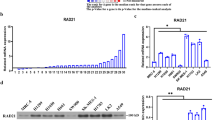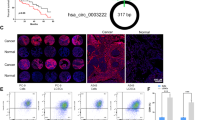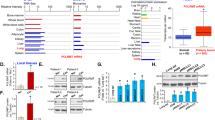Abstract
Transcriptional positive coactivator 4 (PC4) is a multifunctional nuclear protein that has important roles in DNA transcription, replication, repair and heterochromatinization. However, the role of PC4 in cancer remains to be clarified. Several studies propose that PC4 may act as a putative tumor suppressor. Here, we demonstrate for the first time that PC4 may represent a potential therapeutic target in non-small cell lung cancer (NSCLC). PC4 protein expression is significantly upregulated in NSCLC carcinoma tissues compared with their adjacent noncancerous counterparts as shown by immunohistochemical staining and western blotting in 104 pairs of formalin-fixed human NSCLC specimens and 6 fresh NSCLC samples. Knockdown of PC4 expression by sequence-specific small interfering RNA (siRNA) in human NSCLC cells (A549, H460 and H358) significantly inhibits the growth of cancer cells by the induction of cell cycle arrest and the increase of cell apoptosis in vitro. Interrupting the PC4 signaling pathway by injection of the PC4 siRNA liposome complex produced an effective regression of pre-established A549 cell xenografts in mice through growth inhibition and increased apoptosis. These results indicated that PC4 could be an attractive new therapeutic target for the treatment of NSCLC.
This is a preview of subscription content, access via your institution
Access options
Subscribe to this journal
Receive 12 print issues and online access
$259.00 per year
only $21.58 per issue
Buy this article
- Purchase on Springer Link
- Instant access to full article PDF
Prices may be subject to local taxes which are calculated during checkout






Similar content being viewed by others
References
Ramalingam SS, Owonikoko TK, Khuri FR . Lung cancer: new biological insights and recent therapeutic advances. CA Cancer J Clin 2011; 61: 91–112.
Jemal A, Center MM, DeSantis C, Ward EM . Global patterns of cancer incidence and mortality rates and trends. Cancer Epidem Biomar 2010; 19: 1893–1907.
Ramalingam S, Belani C . Systemic chemotherapy for advanced non-small cell lung cancer: recent advances and future directions. Oncologist 2008; 13: 5–13.
Asamura H, Goya T, Koshiishi Y, Sohara Y, Eguchi K, Mori M et al. A Japanese lung cancer registry study: prognosis of 13,010 resected lung cancers. J Thorac Oncol 2008; 3: 46–52.
Pal SK, Figlin RA, Reckamp K . Targeted therapies for non-small cell lung cancer: an evolving landscape. Mol Cancer Ther 2010; 9: 1931–1944.
Yoshida T, Zhang G, Haura EB . Targeting epidermal growth factor receptor: central signaling kinase in lung cancer. Biochem Pharmacol 2010; 80: 613–623.
Aita M, Fasola G, Defferrari C, Brianti A, Bello MGD, Follador A et al. Targeting the VEGF pathway: antiangiogenic strategies in the treatment of non-small cell lung cancer. Crit Rev Oncol Hemat 2008; 68: 183–196.
Li Y, Ye X, Liu J, Zha J, Pei L . Evaluation of EML4-ALK fusion proteins in non-small cell lung cancer using small molecule inhibitors. Neoplasia 2011; 13: 1–11.
Batta K, Yokokawa M, Takeyasu K, Kundu TK . Human transcriptional coactivator PC4 stimulates DNA end joining and activates DSB repair activity. J Mol Biol 2009; 385: 788–799.
Das C, Gadad SS, Kundu TK . Human positive coactivator 4 controls heterochromatinization and silencing of neural gene expression by interacting with REST/NRSF and CoREST. J Mol Biol 2010; 397: 1–12.
Ge H, Roeder RG . Purification, cloning, and characterization of a human coactivator, PC4, that mediates transcriptional activation of class II genes. Cell 1994; 78: 513–523.
Pan ZQ, Ge H, Amin AA, Hurwitz J . Transcription-positive cofactor 4 forms complexes with HSSB (RPA) on single-stranded DNA and influences HSSB-dependent enzymatic synthesis of simian virus 40 DNA. J Biol Chem 1996; 271: 22111–22116.
Conesa C, Acker J . Sub1/PC4 a chromatin associated protein with multiple functions in transcription. RNA Biol 2010; 7: 287–290.
Das C, Hizume K, Batta K, Kumar BRP, Gadad SS, Ganguly S et al. Transcriptional coactivator PC4, a chromatin-associated protein, induces chromatin condensation. Mol Cell Biol 2006; 26: 8303–8315.
Banerjee S, Kumar BRP, Kundu TK . General transcriptional coactivator PC4 activates p53 function. Mol Cell Biol 2004; 24: 2052–2062.
Batta K, Kundu TK . Activation of p53 function by human transcriptional coactivator PC4: role of protein-protein interaction, DNA bending, and posttranslational modifications. Mol Cell Biol 2007; 27: 7603–7614.
Kishore AH, Batta K, Das C, Agarwal S, Kundu TK . p53 regulates its own activator: transcriptional co-activator PC4, a new p53-responsive gene. Biochem J 2007; 406: 437–444.
Kannan P, Tainsky MA . Coactivator PC4 mediates AP-2 transcriptional activity and suppresses ras-induced transformation dependent on AP-2 transcriptional interference. Mol Cell Biol 1999; 19: 899–908.
Wang JY, Sarker AH, Cooper PK, Volkert MR . The single-strand DNA binding activity of human PC4 prevents mutagenesis and killing by oxidative DNA damage. Mol Cell Biol 2004; 24: 6084–6093.
Shi C, Zhu Y, Chung LWK, Su Y, Cheng T . PC4 is a novel oncogenic gene for mesenchymal stem cell transformation and mediates the reciprocal actions between mesenchymal stem cells and prostate cancer cells. Exp Hematol 2008; 36 (Suppl 1): S82.
Soma G, Kitahara N, Andoh T . Molecular cloning and characterization of a cDNA clone for a protein specifically expressed in embryo as well as in a chemically induced pancreatic B cell tumor of rat. Biochem Biophys Res Commun 1984; 124: 164–171.
Yokoi S, Yasui K, Saito-Ohara F, Koshikawa K, Iizasa T, Fujisawa T et al. A novel target gene, SKP2, within the 5p13 amplicon that is frequently detected in small cell lung cancers. Am J Pathol 2002; 161: 207–216.
Sato N, Fukushima N, Maitra A, Iacobuzio-Donahue CA, van Heek NT, Cameron JL et al. Gene expression profiling identifies genes associated with invasive intraductal papillary mucinous neoplasms of the pancreas. Am J Pathol 2004; 164: 903–914.
Kleivi K, Lind G, Diep C, Meling G, Brandal L, Nesland J et al. Gene expression profiles of primary colorectal carcinomas, liver metastases, and carcinomatoses. Mol Cancer 2007; 6: 2.
Maaser K, Daubler P, Barthel B, Heine B, von Lampe B, Stein H et al. Oesophageal squamous cell neoplasia in head and neck cancer patients: upregulation of COX-2 during carcinogenesis. Brit J Cancer 2003; 88: 1217–1222.
Shi H, Chen S, Jin H, Xu C, Dong G, Zhao Q et al. Downregulation of MSP58 inhibits growth of human colorectal cancer cells via regulation of the cyclin D1–cyclin-dependent kinase 4–p21 pathway. Cancer Sci 2009; 100: 1585–1590.
Huang W, Wu D, Xie Z, Zhau HE, Nomura T, Zayzafoon M et al. β2-microglobulin is a signaling and growth-promoting factor for human prostate cancer bone metastasis. Cancer Res 2006; 66: 9108–9116.
Cerchietti LC, Ghetu AF, Zhu X, Da Silva GF, Zhong S, Matthews M et al. A small-molecule inhibitor of BCL6 kills DLBCL cells in vitro and in vivo. Cancer Cell 2010; 17: 400–411.
Weinberg F, Chandel NS . Mitochondrial metabolism and cancer. Ann NY Acad Sci 2009; 1177: 66–73.
Pisani P, Parkin DM, Bray F, Ferlay J . Estimates of the worldwide mortality from 25 cancers in 1990. Int J Cancer 1999; 83: 18-29.
Sato M, Shames DS, Gazdar AF, Minna JD . A translational view of the molecular pathogenesis of lung cancer. J Thorac Oncol 2007; 2: 327–343.
Dempke WCM, Suto T, Reck M . Targeted therapies for non-small cell lung cancer. Lung Cancer 2010; 67: 257–274.
Zhuo W, Wang Y, Zhuo X, Zhang Y, Ao X, Chen Z . Knockdown of snail, a novel zinc finger transcription factor, via RNA interference increases A549 cell sensitivity to cisplatin via JNK/mitochondrial pathway. Lung Cancer 2008; 62: 8–14.
Libermann TA, Zerbini LF . Targeting transcription factors for cancer gene therapy. Curr Gene Ther 2006; 6: 17–33.
Redmond A, Carroll J . Defining and targeting transcription factors in cancer. Genome Biol 2009; 10: 311.
Acknowledgements
This work was supported by the State Key Basic Research Development Program (2012CB518103), Natural Science Foundation Programs (30870966 and 81130026), Chongqing Municipal Natural Science Foundation Program (CSTC2009BA5043) and a program of New Century Excellent Talents in University (NCET) from the Ministry of Education and intramural grants from the State Key Laboratory of Trauma, Burns and Combined Injury to CS.
Author information
Authors and Affiliations
Corresponding author
Ethics declarations
Competing interests
The authors declare no conflict of interest.
Rights and permissions
About this article
Cite this article
Peng, Y., Yang, J., Zhang, E. et al. Human positive coactivator 4 is a potential novel therapeutic target in non-small cell lung cancer. Cancer Gene Ther 19, 690–696 (2012). https://doi.org/10.1038/cgt.2012.52
Received:
Revised:
Accepted:
Published:
Issue Date:
DOI: https://doi.org/10.1038/cgt.2012.52
Keywords
This article is cited by
-
Transcriptional positive cofactor 4 promotes breast cancer proliferation and metastasis through c-Myc mediated Warburg effect
Cell Communication and Signaling (2019)
-
MicroRNA-101 regulated transcriptional modulator SUB1 plays a role in prostate cancer
Oncogene (2016)
-
Peptides derived from the dependence receptor ALK are proapoptotic for ALK-positive tumors
Cell Death & Disease (2015)
-
Inhibition of human positive cofactor 4 radiosensitizes human esophageal squmaous cell carcinoma cells by suppressing XLF-mediated nonhomologous end joining
Cell Death & Disease (2014)



